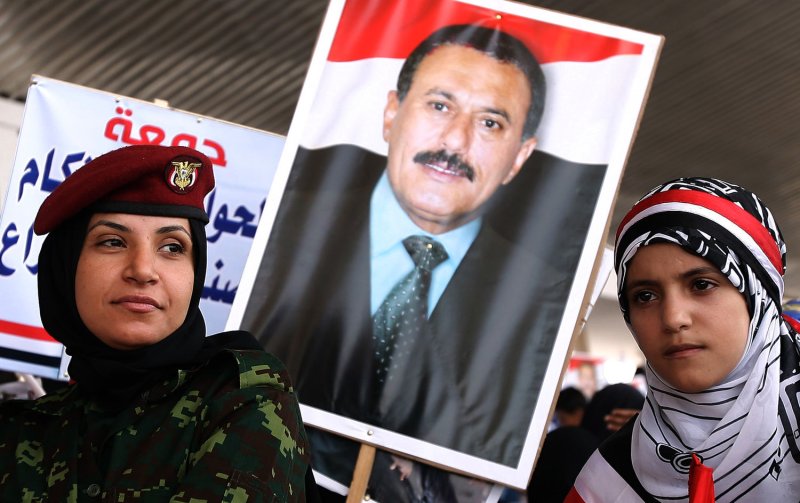Supporters of Yemen's President Ali Abduallah Saleh hold his picture during a rally in his support in Sanaa, Yemen, September 30, 2011. Saleh will be traveling to New York for medical treatment this week. UPI/Abdulrahman Abdallah |
License Photo
HONOLULU, Dec. 27 (UPI) -- The U.S. State Department said Tuesday no decision had been made whether to let Yemen's embattled president into the United States for medical treatment.
While The New York Times reported two Obama administration officials said the White House had decided in principle to let Ali Abdullah Saleh be treated in New York, State Department spokesman Mark Toner said the way had not been cleared.
"Despite reports to the contrary, the United States is still considering President Saleh's request to enter the United States for the sole purpose of seeking medical treatment," Toner said in a statement. "The Department of State will confirm that a decision has been reached only after this process has been completed."
Toner said Saleh's visa request must meet eligibility requirements just like any foreign national seeking to travel to the United States.
"This process can vary in length of time, and until each step of the process is complete, no final determination is made," Toner said. "Only at the end of this internal review process will a final visa adjudication be made."
The two officials told the Times no visa had been issued because the agreement in principle includes conditions -- including a proposed itinerary -- that had not been submitted to the U.S. Embassy in Yemen for forwarding to Saleh, the officials said late Monday.
Saleh contacted the embassy in Yemen's capital, Sanaa, to request the visa, officials said.
The Times initially said on its Web site Monday night the Obama administration had agreed to let Saleh travel to NewYork-Presbyterian Hospital.
The newspaper backed away from its report after White House spokesman Josh Earnest denied a decision had been made.
An administration official told the Times later there was no further "impediment" to issuing a visa to Saleh and he could arrive in New York as early as the end of the week.
Though many Yemenis want Saleh prosecuted for the killing of pro-democracy protesters by his security forces, some in the White House argued giving Saleh a reason to leave Yemen, even temporarily, could help smooth the way to elections next year, the Times said.
"In the end, we felt there was enough good to be gained that it was worth managing the criticism that we'd get, including any comparisons to past episodes," one of the two officials told the Times.
The "past episodes" referred to President Jimmy Carter's 1979 decision to let Mohammed Reza Pahlavi, the ailing shah of Iran, be treated at the same New York hospital Saleh would go to. While it was anticipated the shah's stay would be short, surgical complications required weeks of hospital confinement before he recovered and left for Panama.
The Times said his prolonged U.S. stay so infuriated Iranian revolutionaries who had overthrown the shah that they stormed the U.S. Embassy in Tehran and took 52 Americans hostage in what became known as the Iran hostage crisis, which lasted 444 days.
Saleh -- who would receive treatment for medical problems stemming from a near-fatal bomb blast in June at his presidential-complex mosque -- would be the first Arab leader to request and be granted admission to the United States since political unrest in the region began a year ago.
The June 3 blast caused burns over about 40 percent of Saleh's body, as well as shrapnel injuries, including a collapsed lung, U.S. officials said at the time. He spent three months recovering at a military hospital in Saudi Arabia before returning home.
Saleh's most serious medical condition now is a balance problem caused by inner-ear damage, the Times said.
If he goes to New York, he would not be allowed to bring a large entourage or use his visit for political reasons, one of the administration officials said.















